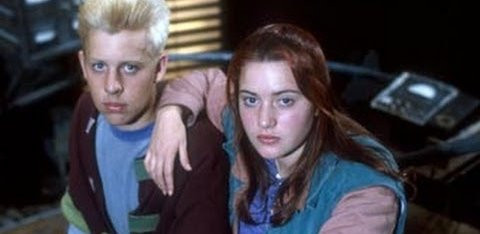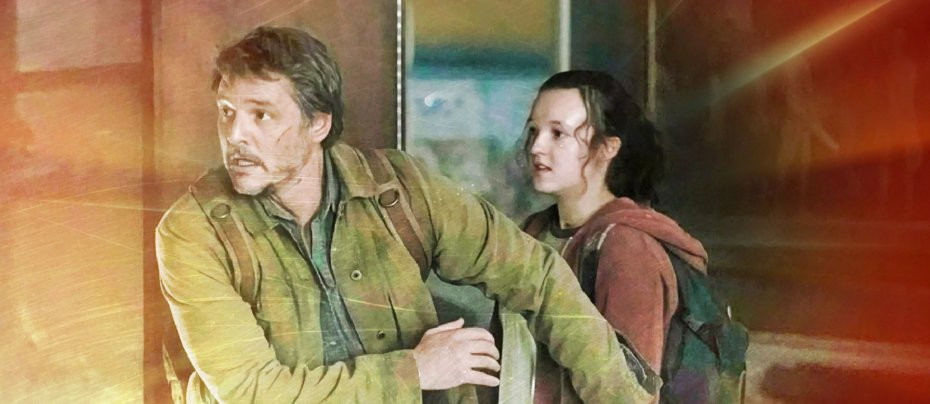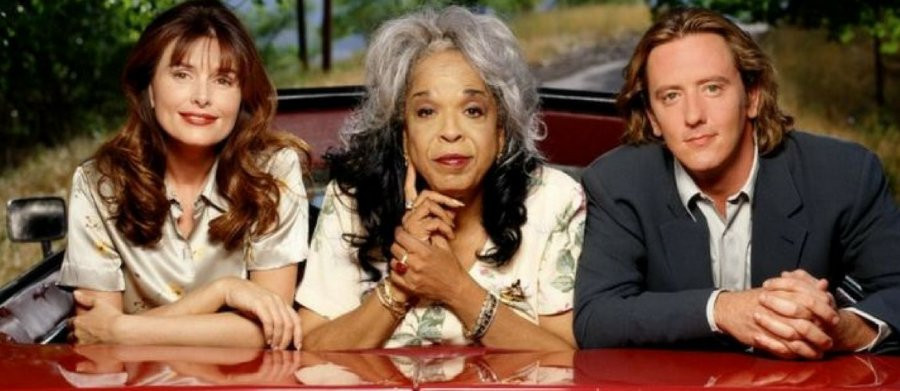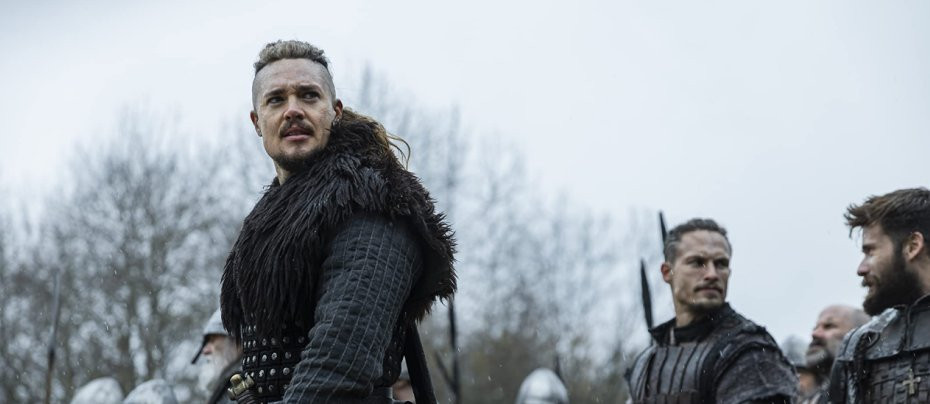
The Last Kingdom: Seven Kings Must Die
2023 - United Kingdom'the real stars are director Edward Bazalgette and his cinematography team. The photography throughout is of the highest quality, but it is the Battle sequence that demanded and demonstrated the greatest expertise'
Review: The Last Kingdom: Seven Kings Must Die by John Winterson Richards
As a rule, feature length "television movies" that conclude or follow up episodic dramas do not have a good reputation. The worst of them are shameless attempts to cash in on the glory days of once popular shows after a long gap, usually with creaky stars who are forced to return to their most famous roles because their subsequent careers did not work out as they intended. Even the better examples tend to fall victim to a technical challenge, the need to balance the requirements of the feature length format - which demand a freestanding story - with the rich texture that has been built up over many episodes that fans expect to see respected.
Your reviewer, a confirmed fan of the BBC-Netflix The Last Kingdom, therefore approached Seven Kings Must Die with mixed feelings. While it was good to join the gang for one more ride, the conclusion of the last season of The Last Kingdom had left our hero, Uhtred of Bebbanburg in a happy place - which was in fact Bebbanburg - and it seemed he had earned the right to live out his life there in peace.
That said, Uhtred has never seemed like a character destined to live in peace and die of old age in his bed - and, as Uhtred himself has always reminded us, "Destiny is all."
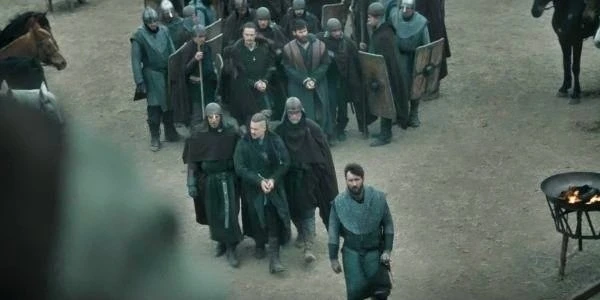
Much of what follows, like Seven Kings Must Die itself, will be incomprehensible to anyone unfamiliar with The Last Kingdom. You really have to watch the five seasons that came before to enjoy it properly. Suffice it to say that our conflicted protagonist, a Saxon raised a pagan Dane who subsequently entered the service of the Saxon Kings Alfred the Great and Edward the Elder, has finally carved his way through those five bloody seasons, about a dozen Viking warlords, and a number of scheming Saxons, to reclaim his paternal inheritance in Northumbria.
He is drawn reluctantly into a succession crisis when Edward's son Aethelstan claims the throne. Uhtred has a great fondness for Aethelstan, who was in effect his foster son, but since then the young Prince has fallen under the influence of an evil adviser. His actions endanger the delicate peace established with Scotland and with the Danish settlers living in the North of England. This leads to an alliance of Kings being formed against the new and still very fragile Anglo-Saxon Kingdom of England, hence the title.
Or perhaps not. It is not entirely clear who the eponymous Seven Kings are. They are mentioned in a dream as having to die and this becomes the spine of the story. It seems their identity is meant to be a mystery, but, if so, it is undermined by some rather misleading subtitles. The Welsh King Hywel Dda, "Howell the Good," is listed among the Seven in the subtitles but there is no hint of him joining the alliance against Aethelstan. Although he was not really "King of Wealas" - the tragedy of Wales is that it was split into feuding Kingdoms - history confirms that he was one, and by far the most important, of several Welsh Kings who acknowledged Athelstan's overlordship and that he remained loyal. Whether he was present at the decisive Battle of Brunanburh as Seven Kings portrays him is uncertain: the Annales Cambriae with typical understatement refer simply to "war at Brune" in 937 AD.
The three Kings who actually took the field against Athelstan at the Battle of Brunanburh were Constantine the King of Scots, the Brythonic King Owain of Strathclyde, and the Viking Olaf of Dublin, also known as Anlaf, which is how Seven Kings describes him. Seven Kings has them joined by the Viking Kings of Man, Orkney, and Shetland, to give a total of six, but there is no historical evidence of this and, in any case, Orkney and Shetland were ruled by a single Earl, not by two separate Kings. The Anglo-Saxon Chronicle and other sources refer to five Kings being killed, not including Constantine, Anlaf, or, as far as we know, Owain. If so, they were probably Viking or Irish sub-Kings, of whom there was no shortage. At one point, Uhtred wonders if he might himself be one of the Seven prophesied to die, but he too is an Earl not a King. Perhaps the moral of the story is not to read too much into casual dreams.
It should be noted that Seven Kings Must Die departs significantly from the plot of the Saxon Stories, the cycle of novels by Bernard Cornwell on which The Last Kingdom is based. Even so, it tries to cram a lot into a very short time. This is due in large part to that technical problem of trying to combine a distinct story with a beginning, middle, and end of its own and the return to the densely populated world built up over five seasons. The core audience for the project is the established fan base eager to revisit as much of that world as possible.
As a result, we are taken through the story at a very brisk pace. This is done efficiently and there is no time to get bored, but neither is there time for character and plot development. In particular it is frustrating that we find out little about the new characters introduced in Seven Kings Must Die and the relationships between them. We learn that Anlaf is very fond of his daughter who is a spy at Aethelstan's court, a situation that sets up no end of dramatic possibilities - which are never explored because that is basically all we ever learn about them.
At the same time, while it is pleasant to catch up with some old friends, none is given much in the way of character arc. There is the usual The Last Kingdom quota of deaths and a hint at a love affair but nothing in which one feels any great emotional investment.
This begs the obvious question whether it might not be a been better to conclude with a complete sixth season or at least a "miniseries" rather than a "television movie" of under two hours? The answer to that question is obviously financial, and one can see why they were saving their money: everything in the somewhat perfunctory plot is building towards the Battle of Brunanburh, and they needed every penny for the big set piece in the third act
And it shows. This is why Seven Kings was worth making and is definitely worth watching. It delivers one of the best battle sequences in film history - not just television history: it rivals the best cinema has to offer.
Brunanburh is not as well known in England as it ought to be. It is perhaps the decisive moment in the unification of England and the establishment of English hegemony over the rest of the British Isles. It is also the topic of one of the great poems of Anglo-Saxon literature.

The Battle is shown in Seven Kings Must Die much as it is described in the poem, and like most battles in the Middle Ages, as a gigantic scrum. There is no hint of the usual Hollywoodism of two sides running at each other before everyone pairs off into private fencing matches. Most pitched battles in the days before gunpowder came down to what we see here, two battle lines physically pushing against each other until one broke. Victory depended on weight, brute strength, and endurance, not fancy swordsmanship. This is where the bulky meat-eating Vikings usually had the advantage (it is said that the first Christian in Iceland who gave up meat for Lent was a wonder to his neighbours, who thought he would die of starvation). The Last Kingdom was always very good at showing the importance of the battle line, but Seven Kings gives us an even better sense of being there, plus the added bonus of showing the effectiveness of the flying wedge tactic known as the "swine's snout" at breaking thin or faltering lines.
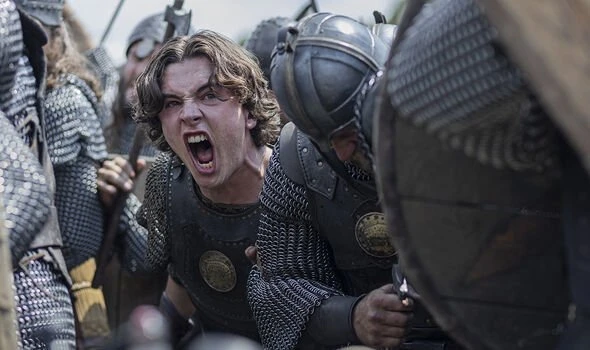
We also get to experience the tension before the fight - when a bad joke can release a wave of brittle laughter. There is no holding up of hands for permission to go to portable toilets next to the battlefield, so even brave men void their bladders where they stand - and presumably their bowels too, even if, mercifully, Seven Kings stops short of showing us that detail. What it does show is that soon all the fighting men are covered in the mud formed by this process. Those who are struck down are trampled into it mercilessly, possibly by their own side. All seems like chaos and confusion even from the point of view of commanders. Major characters are the victims of random arrows and spear thrusts from nameless footsoldiers, not Homeric blows.
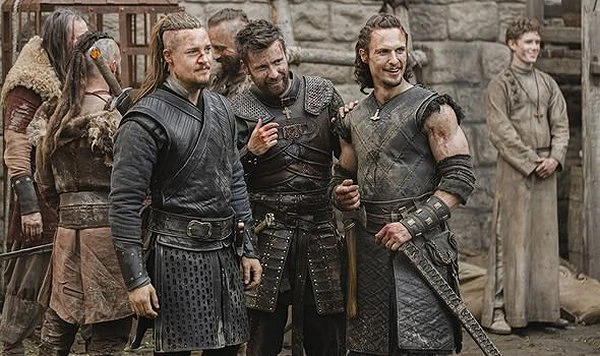
The point of this is that the individual is rather lost in the crush and caught up in the flow of events. In this sense what is true of the Battle sequence probably sums up the whole project. Seven Kings is not a showy actor's piece. This is not a criticism of the cast - quite the contrary: they all know what is expected of them, especially the regulars who ease back into their old roles without fuss. Alexander Dreymon has already proved himself a fine leading man as Uhtred, and he is given great support by Mark Rowley as his Irish second in command. A number of other familiar faces make welcome returns, and it is perhaps churlish to complain that Eliza Butterworth and Eva Birthistle are not among them - just saying they are missed. Some surprise cameos towards the end pack a punch.
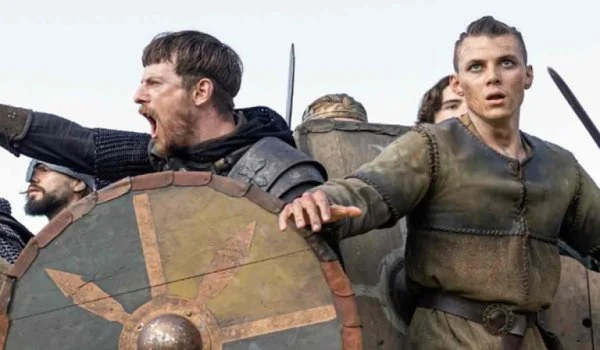
Yet is fair to say that the real stars are director Edward Bazalgette and his cinematography team. The photography throughout is of the highest quality, especially some beautiful landscape work, but it is the Battle sequence that demanded and demonstrated the greatest expertise. One suspects that Bazalgette, or his editor and cinematographer, were not unfamiliar with Orson Welles' masterpiece Chimes At Midnight. If so, they improved on it.
The script departs radically from history in some respects, especially in its casual attitude to chronology and its treatment of Aethelstan, who was by this point a highly accomplished warrior-King, not a weak minded boy. At the same time it remains very accurate in most points of detail, as one would expect of a work based on Cornwell books. Perhaps more importantly, it leaves the impression that it could have been like this.
The ending is satisfying. One might still think that this final journey with Uhtred was not really necessary, but to have gone so far with him and not taken him all the way to the Battle of Brunanburh would have been a missed opportunity. As it is, they made the most of it.
Seen this show? How do you rate it?
Seen this show? How do you rate it?
Published on May 9th, 2023. Written by John Winterson Richards for Television Heaven.







